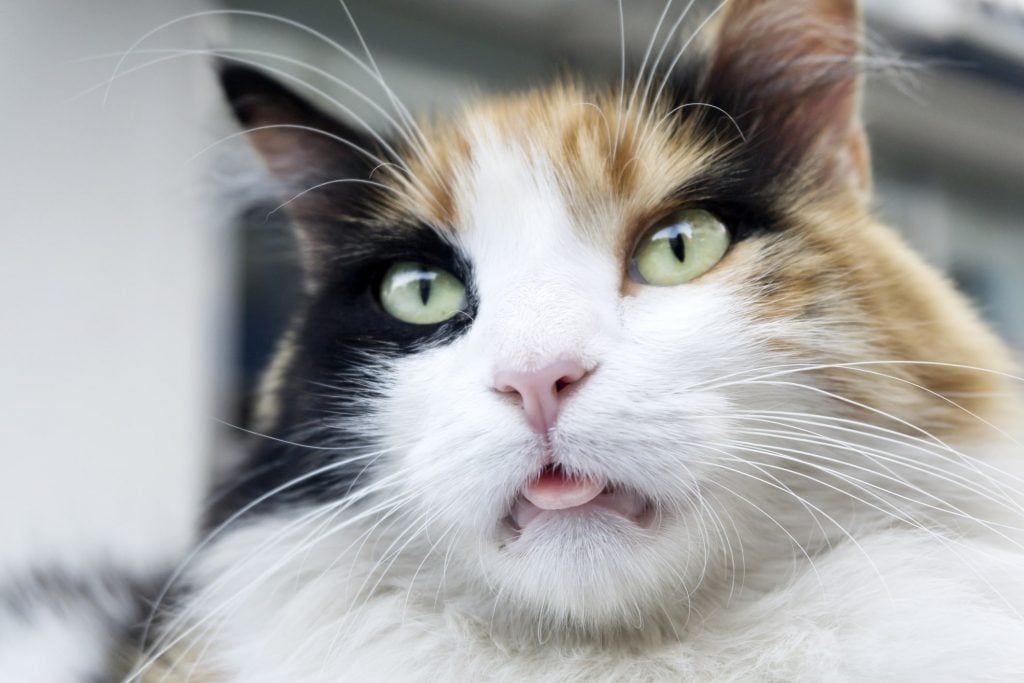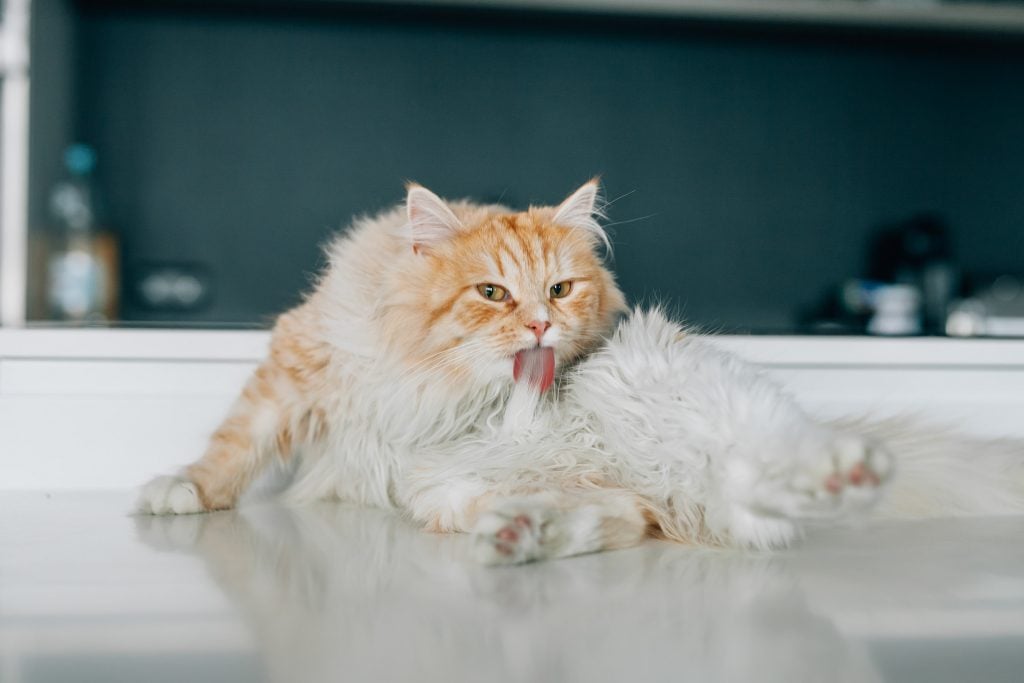- Not a substitute for professional veterinary help.
There’s a reason why #tongueoutTuesday trends on Instagram week after week—a cat with her tongue out is adorable. But why is my cat sticking her tongue out? Is it harmless or is it a sign of something more serious?
We spoke with three veterinarians who explained there’s actually a lot of different reasons why this behavior happens.
Why Cats Stick Out Their Tongues
Reason #1: Your Cat Is Blepping
If you’re a cat owner or lover, you’ve seen it before: the blep. Blep is when a cat (or even a dog) doesn’t put her tongue back where it belongs after sticking it out for some reason—and then we humans are rewarded with a little peep of kitty tongue that is just so cute. Go ahead, try not to boop that blep.
Leanne Lilly, DVM, DACVB, Assistant Professor of Veterinary Clinical Sciences, Behavioral Medicine at Ohio State University, says it’s normal for cats to blep, as long as they don’t appear to be in distress or your cat is suddenly doing it all the time.
Often, blepping is because your cat simply forgets to put her tongue back in, perhaps after being startled during grooming or because she became distracted eating or smelling something. In other kitties, particularly senior cats, consistent bleps could be a sign of dementia.
“If it’s a new behavior, if it’s constant, or if it comes with any other changes in how your cat is doing on a day-to-day basis, it’s best to check with your vet,” Dr. Lilly says.
Reason #2: Your Cat Is Relaxed or Sleeping
Ever wake up and realize your mouth has been gaping open, drool dribbling out? Yep, that happens to kitties too. During sleep, your cat’s muscles relax, causing her mouth to open slightly and maybe even her tongue to roll out. Perhaps kitty is dreaming and making little sounds and clicks with her tongue. This is usually not a cause for concern.
Reason #3: Something Is Stuck to Her Tongue
As a cat mom, I seem to always have cat hair stuck to my tongue. Now imagine you have tiny hook-like structures all over your tongue—and that you have fur and lick yourself clean.
These tiny hook-like structures are called papillae, and they’re the reason kitty kisses feel like sandpaper. The papillae clasp onto food, loose hair, and help cats lap up water. So, it’s no surprise that stuff can get stuck to cat tongues, and if your cat’s tongue is sticking out, she might just be hoping that whatever is stuck to it will come off.
jakubzak via iStock
Reason #4: Your Cat’s Breed Is Predisposed to It
Just like dogs, there are brachycephalic (also called short-nosed or flat-faced) breeds of cats. Persian, Himalayan, and Burmese cats share this smooshy-faced trait and excel at #TongueoutTuesday. Just like kitties with missing teeth or malformed jaws, brachycephalic breeds don’t have quite the right anatomy to keep their tongues inside at all times.
See reason #7 for another breed-related cat tongue issue.
Reason #5: Your Cat Has Motion Sickness, Is Stressed, or Has Anxiety
If you notice your cat sticking out her tongue while traveling in the car, she might have motion sickness. Motion sickness in cats is typically caused by the stress and anxiety that go along with traveling, according to VCA Animal Hospitals.
When traveling in the car, or during another stressful or anxiety-inducing event, you can prepare to calm your cat’s anxiety with desensitization training, calming pheromone spray, or a ThunderShirt.
Reason #6: Your Cat Is Nauseous
Yep, kitties get nauseous, too, and can it become obvious with that unmistakable sound of a cat vomiting. You may notice your cat licking her lips excessively, or what some describe as the flickering of the tongue. The list of reasons your cat could be feeling nauseous is long: changes in diet, eating something indigestible, eating too fast, overeating, eating something spoiled, licking something with an unpleasant taste, motion sickness, allergies, hairballs, certain medications, and probably more. It’s best to try to narrow down the potential cause and contact your vet for appropriate care.
Reason #7: It’s a Neurological Issue
“Since control of the tongue also involves the neurological system, a handful of more complex and less common neurological or neuromuscular diseases may also lead to abnormal movements of the tongue,” explains Dr. Rebecca Greenstein, Rover Dog People panelist and Chief Veterinarian at Kleinburg Veterinary Hospital in Ontario, Canada. Typically, a neurological disease will also be accompanied by other abnormal or odd movements in your cat, and you’ll need to see your vet to diagnose if this is what’s making your cat’s tongue stick out.
Dr. Lilly adds that an uncommon but serious neurological illness affecting cat tongues is Feline Orofacial Pain Syndrome. If you spot your cat sticking her tongue out repeatedly in an abnormal licking motion or chewing at her paws, tongue, and cheek to the point of hurting herself, take your cat to the vet. Oddly, this issue seems to be concentrated among a specific kind of cat. “For reasons we do not understand, this is most common in Burmese cats,” Lilly says.
Reason #8: Your Cat Has a Respiratory Infection or Blockage
“If your cat has been coughing, has a history of heart or respiratory disease, appears to have labored breathing, is gasping for air, or has blue-tinged gums or tongue, it’s better to be safe than sorry and seek veterinary attention immediately,” Greenstein says.

123ducu via istock
Reason #9: Your Cat Is Hot
While your cat may need to catch her breath after an intense game of laser chasing, panting in cats isn’t normal like it is in dogs. So, if you notice your cat sticking her tongue out, panting, or acting lethargic on a hot day, find her a cool place with fresh water. If your kitty becomes distressed or collapses, she should be taken to the vet right away as she could be experiencing heatstroke.
Reason #10: You Cat Has Periodontal Disease
If your kitty sticks her tongue out and it’s accompanied by excessive drooling, lack of interest in food, discomfort while eating, or stinky breath, she might need to see her feline dentist. Bacteria and food can build up on your kitty’s teeth, progressing to plaque. Good dental hygiene in cats, just like humans, will remove plaque, prevent the build-up of tartar, and prevent the progression to gingivitis and periodontal disease, according to VCA Animal Hospitals.
Dental hygiene and routine dental check-ups aren’t just for humans, Dr. Lilly explains. “Full dental cleanings and evaluations are recommended for cats starting at one year of age. So, if your cat hasn’t had one and is over one year old, best to schedule that anyway, bleps or not.”
Reason #11: Your Cat Has Stomatitis
“Stomatitis is inflammation in the mouth of a cat (really red, irritated gums, tongue, and other oral tissue),” explains Dr. Kat Pankratz, DVM, DACVB, veterinary behaviorist at Animal Behavior Clinic in Portland, Oregon. “Stomatitis can be a very painful disease with the most common symptoms being decreased appetite, drooling, bad breath, and an unkempt coat.” Symptoms can also include the hanging out of the tongue and pawing at the face.
The Takeaway
In general, there is a good chance your kitty is just being cute when she sticks her tongue out. But in closing, Dr. Pankratz echoes the advice Dr. Lilly offered at the beginning of this article.
“If there are any other potentially concerning signs including dropping food from their mouth when they are eating, change in appetite, change in grooming habits, or change in behavior, consult with their primary veterinarian. If your cat is open mouth breathing—opening their mouth to breathe instead of breathing through their nose—this could be a medical emergency and you should consult with a veterinarian right away,” advises Dr. Pankratz.
Bonus: Kitty Tongue Trivia
Did you know? According to Dr. Pankratz, “when a cat licks their lips—longer tongue action along one or both sides of the mouth—this is often a signal that they like what they are eating or smelling. When a cat flicks their tongue—quick tongue action often just to the front of their nose—this often signals that they dislike what they smelled or tasted.”
